Thursday Feb 26, 2026
Thursday Feb 26, 2026
Friday, 6 March 2020 00:00 - - {{hitsCtrl.values.hits}}
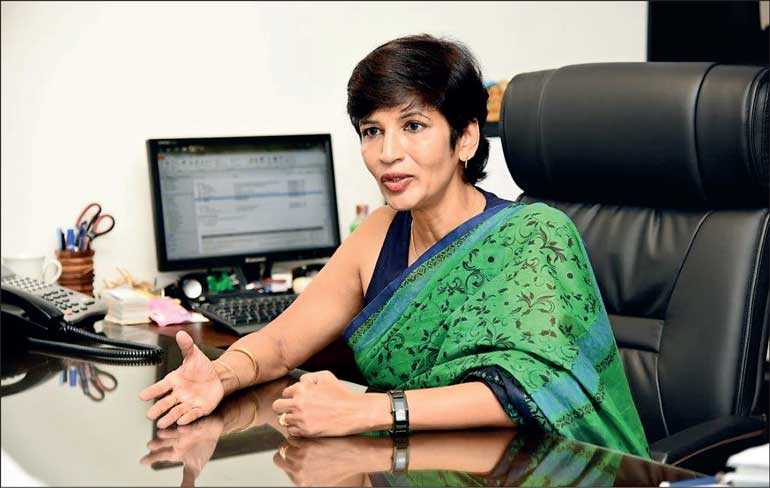
Despite the immense progress that has been made in terms of women’s rights, the gender with which a person is born is still a key determining factor when it comes to employment. This unfortunate reality is arguably most visible in the agriculture sector where women farmers play a pivotal role but tend to be paid less, and provided less opportunities to grow, despite making up 38% of the sector’s labour force.
Sharing her own unique perspectives – both as the Managing Director Hayleys Agriculture, of one of the country’s largest integrated sustainable agri-solutions provider and exporter – and as the first woman to be appointed to the Board of Directors at Hayleys PLC, Jayanthi Dharmasena elaborated on her vision for an inclusive, and equitable approach to agriculture capable of transforming farmers – both male and female – into financially-empowered entrepreneurs. Following are excerpts:
Q: How significant a role do women play in the agriculture sector?
A: Women play an extremely important role in agriculture, and in the broader economy as well. Looking back even into pre-colonial times, Sri Lanka has always been primarily agrarian and throughout there have been limitations placed on women. One of the biggest has been this cliché that the role of a woman ought to be confined to the household. This type of thinking was inherently flawed, and unsustainable. 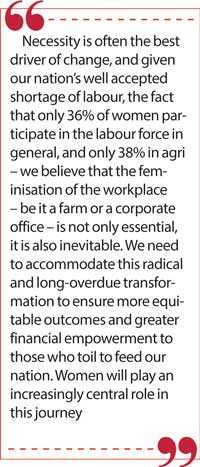
In life and in business, change is the only certainty. Today the agriculture sector is entering such a phase particularly in terms of out-migration of labour, emerging business models, and crop mix. Agriculture in Sri Lanka is evolving and with intelligent interventions, these can lead to a fundamentally stronger, more sustainable system.
Necessity is often the best driver of change, and given our nation’s well accepted shortage of labour, the fact that only 36% of women participate in the labour force in general, and only 38% in agri – we believe that the feminisation of the workplace – be it a farm or a corporate office – is not only essential, it is also inevitable.
We need to accommodate this radical and long-overdue transformation to ensure more equitable outcomes and greater financial empowerment to those who toil to feed our nation. Women will play an increasingly central role in this journey.
Q: What are some of the most important shifts that you see taking place in the Sri Lankan agri-sector over the short-medium term?
A: There is a common perception that there is no money to be made in agriculture, and that those that engage in farming will always be poor. And make no mistake: poverty in the agri sector is a major challenge, and it cannot be resolved by applying the same type of thinking to problems that have existed for generations. We need new ideas that challenge the status quo and blend socially progressive ideas – like women’s empowerment with emerging affordable technologies and innovative business models.
To use an example from our own business, we can consider the state of agriculture in Vakarai in the Batticaloa District.
This was a region that was originally heavily oriented towards traditional agriculture. However 30 years of conflict decimated agricultural production in the region and by the end of the conflict, most able bodied men had switched to unproductive fisheries with no guaranteed income. However, there was still a substantial proportion of women left to manage households, and who were desperately in need of their own streams of income, including numerous war widows.
Many of these households were being torn apart by extreme poverty. This was a difficult and highly sensitive area to approach, however despite the challenges we saw a major opportunity to uplift these communities, and empower women in the process.
Instead of re-introducing traditional agriculture such as paddy farming – which has about two productive seasons, accompanied by a gestation period of five to six months and is therefore more subject to disruptions from extreme weather – we decided to create an alternative.
Working with farmers including women and war widows, we provided planting material for green cucumbers which could then be harvested and processed as pickles and exported to global markets. We set-up the out-grower network under the Agriculture Modernisation Project (ASMP) of the Department of Agriculture to ensure that each farmland had the irrigation system complete with sprinklers to conserve water and save labour. 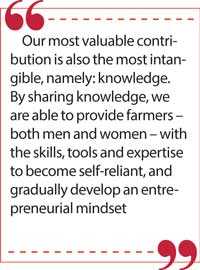
This is a crop which does not require sustained and intensive effort to grow and harvest and the use of modern technology meant that women could balance their obligations to the household, while also maintaining these short-season cash crops and earning a significant income – especially when compared to traditional paddy farming. Our goal was to convert these women from “farmers” into empowered entrepreneurs.
Moving forward we need to replicate and adapt this approach to meet the needs of communities island-wide. In that regard we are proud of the pioneering work that Hayleys Agriculture has carried forward, introducing new technology and drought resistant planting materials, while building individual relationships into vibrant out-grower networks. These are the types of strategies which hold the key to greater prosperity in the agriculture sector.
Q: What are the key contributions that corporates should seek to provide to achieve such a goal?
A: Our most valuable contribution is also the most intangible, namely: knowledge. By sharing knowledge, we are able to provide farmers – both men and women – with the skills, tools and expertise to become self-reliant, and gradually develop an entrepreneurial mindset.
When it comes to agricultural practices, like the optimisation of fertiliser use as an example, we often find that farmers seeking to increase their yields will apply fertiliser in excess of what is required.
While this does help to increase yields, it also creates major challenges – especially in terms of pest and weed control. Therefore we spend a lot of time educating farmers on these dynamics, and supporting them to diversify the mix of crops that they grow and optimise their use of fertiliser across all of their produce, rather than depending solely on a single crop.
More broadly, Hayleys Agriculture also makes vital contributions in extension services, and the facilitation of guaranteed buy-back agreements with out-grower networks, in order to ensure a stable return to out-growers. In this manner we establish a supply chain into international markets, thereby ensuring that socially progressive projects are also economically sustainable.
Q: Upward mobility is another major challenge in the agriculture sector, do you see opportunities for women in agri outside of field work?
A: Most certainly. There is a common perception that the agri-business is confined to the field, when it fact, there is an entire chain of functions – from extension services to logistics, value-addition, and marketing – all of which are jobs that are ripe for female participation.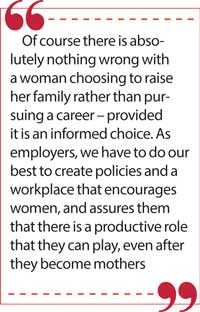
Of course, we are an equal opportunity employer and as such we do not set any hard quotas on the number of men or women we hire. Instead we always hire solely based on merit, and we do our best to ensure that our work environment remains accommodating and accepting to all of who willing to put in the effort.
Among our most recent hires was a Quality Assurance Officer at the Hayleys Agri crop solutions production facility – and for the first time, we have been able to recruit a woman to the position. She is just as capable as a man with the right qualification and we are doing our utmost to ensure that her work environment enables her to always give her best.
Just like her, there are plenty of Sri Lankan women who are smart, driven, and possess excellent academic qualifications. Unfortunately, many of them are either convinced or compelled to restrict themselves to the household. They may work for a short time, but when they want to start a family, they may decide to become dependent on their husband’s income.
This is a serious shortfall in our society, and it is imperative that we push our women to aspire to more. Of course there is absolutely nothing wrong with a woman choosing to raise her family rather than pursuing a career – provided it is an informed choice. As employers, we have to do our best to create policies and a workplace that encourages women, and assures them that there is a productive role that they can play, even after they become mothers.
In that regard, I’m glad to say that attitudes are changing, and I have personally seen this change gather momentum during my 29 years at Hayleys and even prior. Today I see women working in areas beyond support services, and Hayleys has fantastic ladies leading several units, and there is belief they can move forward.
Q: What inspired you to join the workforce, and strive for a leadership role?
A: Coming from a family where no one was in the private sector and my father being a doctor my family always assumed I would follow in his footsteps to become a medical practitioner. This was what drove me to select the science stream in A/Ls and I am grateful I did because it gave me the foundation to understand the more complex scientific aspects of agriculture later in my career.
Even though I wasn’t a terrible student, I didn’t score enough to enter medical school. So while I was considering the option of private medical school at the time, I thought of following the foundation stage of CIMA as that program seemed quite interesting for some of my friends who were close to completing the course.
I took to the subject like a duck to water from my first class, and when the time came to pay for medical school, I had already completed the first stage in CIMA and knew this was what I was going to do. I discussed it with my mother, who was very supportive and strongly encouraged me to follow my passion and always believe in myself. Once I understood that I could excel at my work, I never wanted to stop, and to this day I’m always excited to get into the office and start my day. 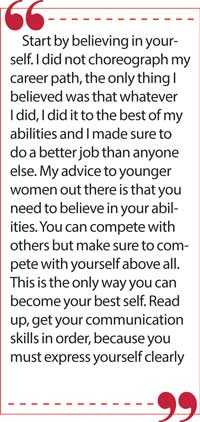
Throughout, I would say that my mother was always my most significant role model. I lost my father at a very young age, and my mother was therefore left in a very difficult position with three young children. She had been raised with a very traditional and conservative mind-set and never having to work for a living however, very quickly she had to learn to manage the finances and take care of the children.
When it became clear that she couldn’t rely on drivers to run her errands, she realised she needed to learn to drive, and was one of the very first female students enrolled at Daya Learners, and in just three short months she was picking us up from school. I would often tag along with her as she went about her day, and even though I was very young, I matured quickly as I watched her learn to administer the household, do her taxes, and get about her life. From her example I learned that there are no limitations to what we can do, aside from those we accept ourselves.
Q: Based on your experience as the first women to join the Hayleys Board of Directors, what are some of the most important factors that enabled your success?
A: In my current role, I would say that I’m fortunate to enjoy the complete trust and support of the Board, but it wasn’t just luck. Ultimately, it was hard work, dedication, and a personal commitment to always deliver my best efforts no matter what, that enabled me to rise through the ranks. The fact that I am the first woman on the Board is not actually something I reflect on. I consider myself an equal and capable of delivering results. It doesn’t bother me if the people I work with are men or women. The majority of my professional career has been with Hayleys, and I can state with confidence that it is our work ethic, not our gender that determines our value. This is why I’m confident that more women will rise in the ranks just as I did.
Q: What are some employee initiatives you have taken since you were appointed to the board of directors?
A: Mentoring is one of the most significant initiatives I began after my appointment to the Board. I believe that my employees need to be encouraged and pushed to move up the ranks. This is the next generation, and they could one day be running these companies, so it is important that we as leaders share our experiences, and help others to learn succeed – whether they are men or women.
Q: What is the message to the women who are deciding on their future path?
A: Start by believing in yourself. I did not choreograph my career path, the only thing I believed was that whatever I did, I did it to the best of my abilities and I made sure to do a better job than anyone else. My advice to younger women out there is that you need to believe in your abilities. You can compete with others but make sure to compete with yourself above all. This is the only way you can become your best self. Read up, get your communication skills in order, because you must express yourself clearly.
As you move forward, your career path may not be linear, so always stay open to opportunities and seize them, even if it takes you down a path you didn’t plan on. The more you are challenged, the more you evolve.
I also want to emphasise that a career does not have to come at the expense of a family. I am also married with two grown-up sons, so I’m speaking from experience, it is possible to do both. Lastly I would say pick something you want to do and are good at, don’t do something because the world around you wants you to.